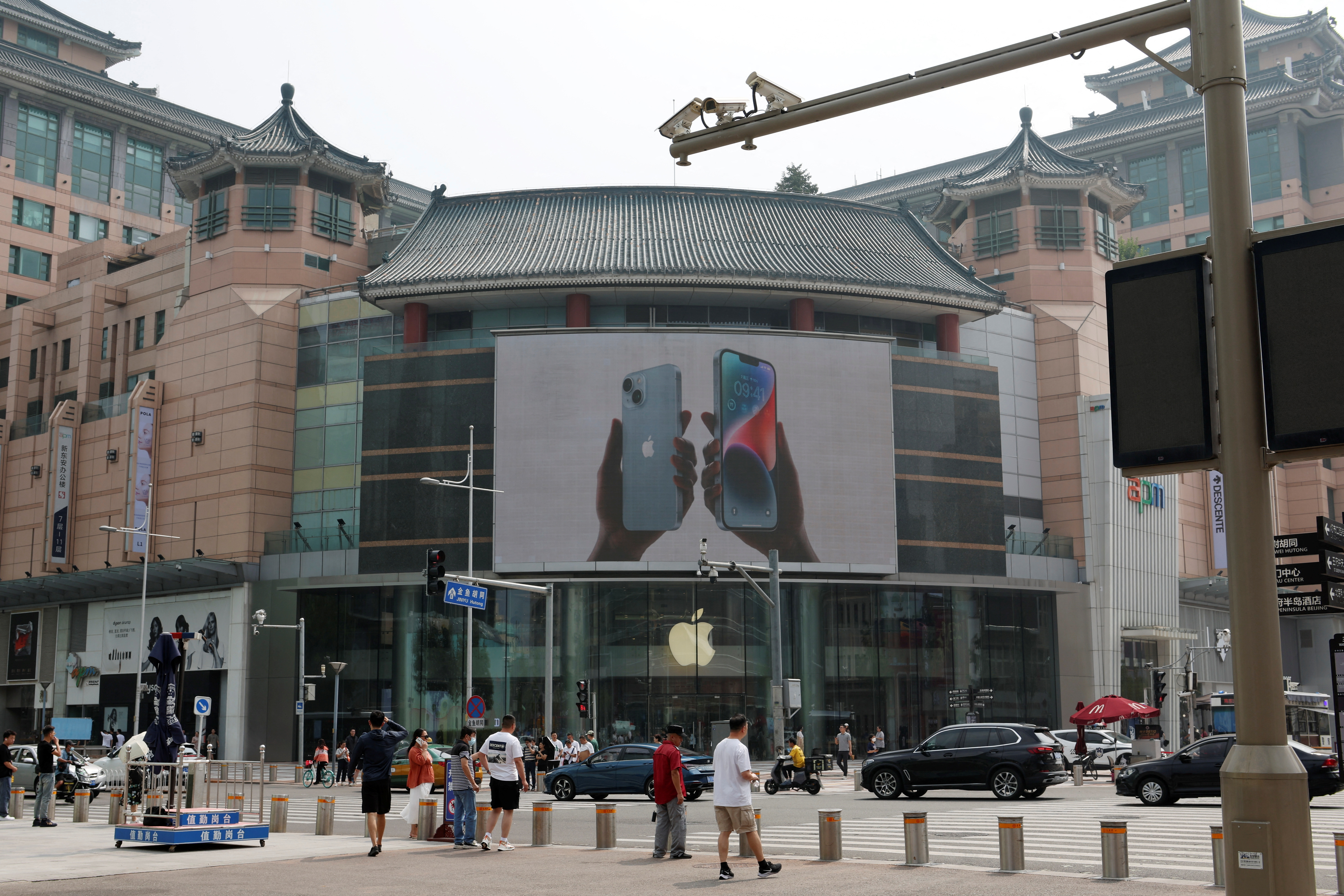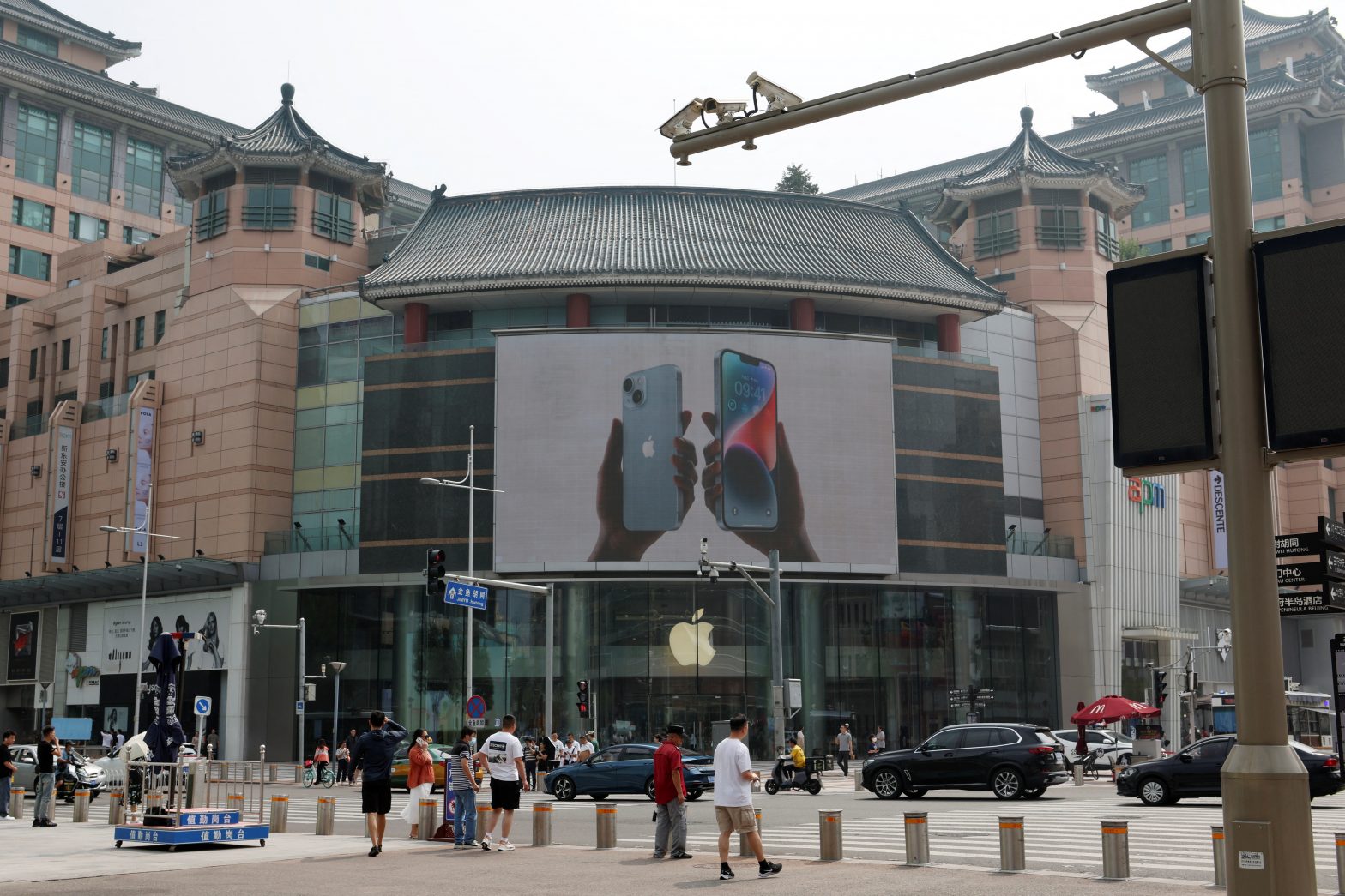
Surveillance cameras are seen near an iPhone advertisement at an Apple store in Beijing, China September 7, 2023. REUTERS/Florence Lo Acquire Licensing Rights
HONG KONG/BEIJING, Sept 7 (Reuters) – China has in recent weeks widened existing curbs on the use of iPhones by state employees, telling staff at some central government agencies to stop using their Apple (AAPL.O) mobiles at work, two sources familiar with the matter said.
Against a backdrop of tensions between Beijing and Washington, the extension of a ban imposed more than two years ago signals growing challenges for the U.S. company, which relies heavily on China for revenue growth and manufacturing.
Staff in at least three ministries and government bodies were told not to use iPhones at work, said the sources, who declined to be named due to the sensitivity of the situation.
One of the sources said they had not yet been given a deadline to cease their iPhone use.
Apple shares were down over 3% in early trading on Thursday, after ending 3.6% lower in the previous session when China’s move to ban the use of iPhones by certain officials was first reported.
Apple and China’s State Council Information Office, which handles media queries on behalf of the government, did not immediately respond to requests for comment.
It was not immediately clear how widely the ban was being enforced, with a third source at one of the three ministries saying he was still using an iPhone and had not yet heard about the restriction.
A fourth source, at a Chinese regulatory body, said they had not been explicitly barred but were told they would be held responsible should any issues emerge with their use of iPhones.
A fifth source at another regulatory body said senior staff had two years ago already been required to swap their iPhones for locally made brands such as Huawei Technologies (HWT.UL).
In 2020, state-owned Chinese financial publication Economic Observer reported that some government agencies had implemented rules to ban officials from using iPhones due to Apple’s strict privacy rules that make it difficult for anti-corruption officials to access and investigate suspects’ phones.
Apple’s shares slipped on Wednesday and Thursday after the Wall Street Journal first reported the move, amid fears of tit-for-tat action as Sino-U.S. tension rise.
Bloomberg on Thursday reported that China planned to broaden the ban to state firms and agencies, citing sources.
STRONG SALES
Citi analysts noted that the news had also weighed on the shares of Apple suppliers and said the market may have “have overreacted to the news flow amidst weak confidence overall,” citing how shares in suppliers of U.S. automaker Tesla (TSLA.O) tumbled but quickly recovered after reports of China restricting its cars from entering military complexes in 2021.
China is one of Apple’s biggest markets and generates nearly a fifth of its revenue. Apple together with its suppliers employs thousands of workers in China and CEO Tim Cook stressed its long ties with the country during a March visit to Beijing.
Apple has been enjoying strong sales in China, ranking in third place in overall smartphone shipments in the second quarter according to consultancy Canalys, partly thanks to the hit to Huawei’s mobile business from U.S. sanctions, which has left it the main premium smartphone maker in China.
“We believe the restrictions have the potential to slow Apple’s sales growth in China,” D.A. Davidson analyst Tom Forte said.
“This could provide an additional challenge for the company, as its revenues from China have already been negatively impacted by a challenging macroeconomic environment in that country.”
China has increasingly emphasized using locally made tech products, as technology has become a major national security issue for Beijing and Washington.
Government agencies and state-owned enterprises (SOEs) in both countries have been the first and most important areas to push forward such a campaign.
A major part of the campaign centred on requiring government departments and SOEs to replace foreign-made products in their IT systems with domestic alternatives.
The replacement effort accelerated this year in China after an order was issued to SOEs by the state asset regulator, which required they complete the replacement tasks by 2027 in critical IT infrastructure such as office software platforms.
Chinese rivals to Apple include Xiaomi (1810.HK), Oppo and Vivo.
Huawei last week unveiled its latest Mate 60 Pro smartphone that teardown firms say contains a domestically developed advanced chip and could bring it back to rivalling Apple.
Reporting by Hong Kong, Beijing and Shanghai Newsrooms; Additional reporting by Yuvraj Malik and Jaspreet Singh in Bengaluru; Writing by Brenda Goh; Editing by Alexander Smith and Shounak Dasgupta
Our Standards: The Thomson Reuters Trust Principles.
